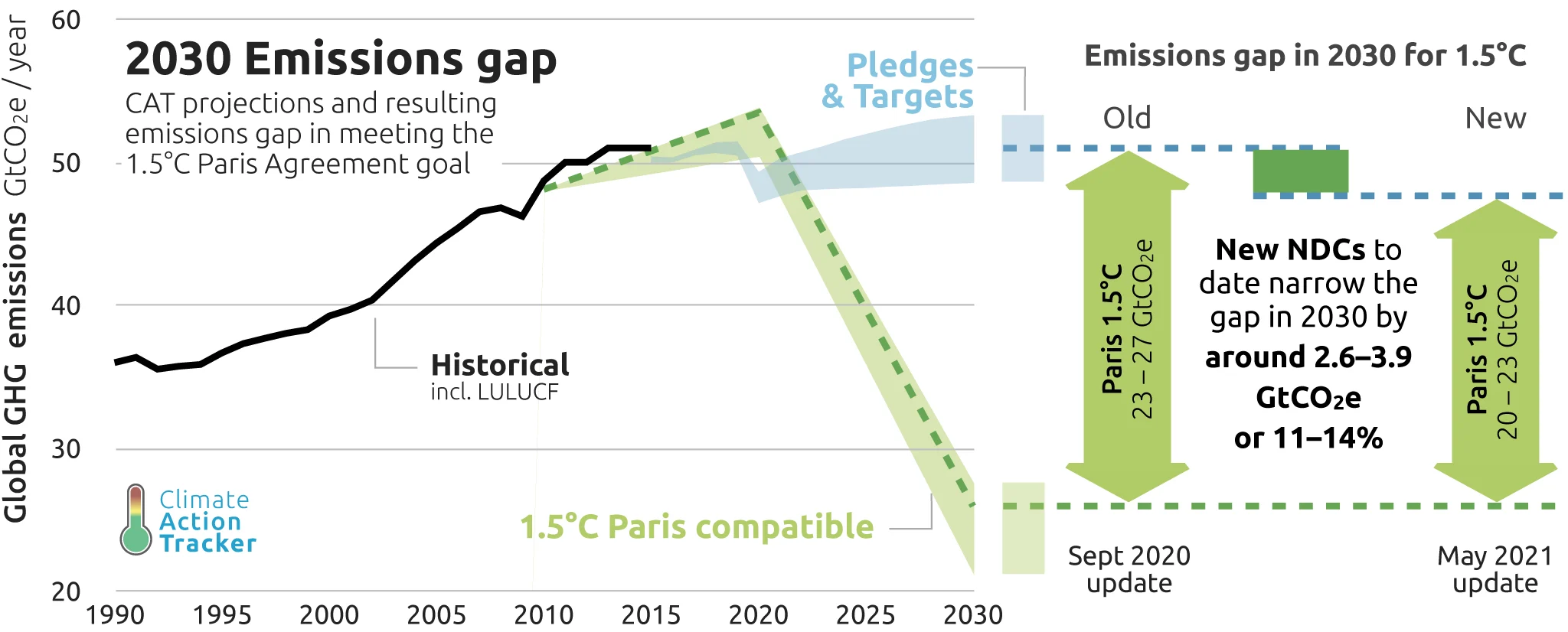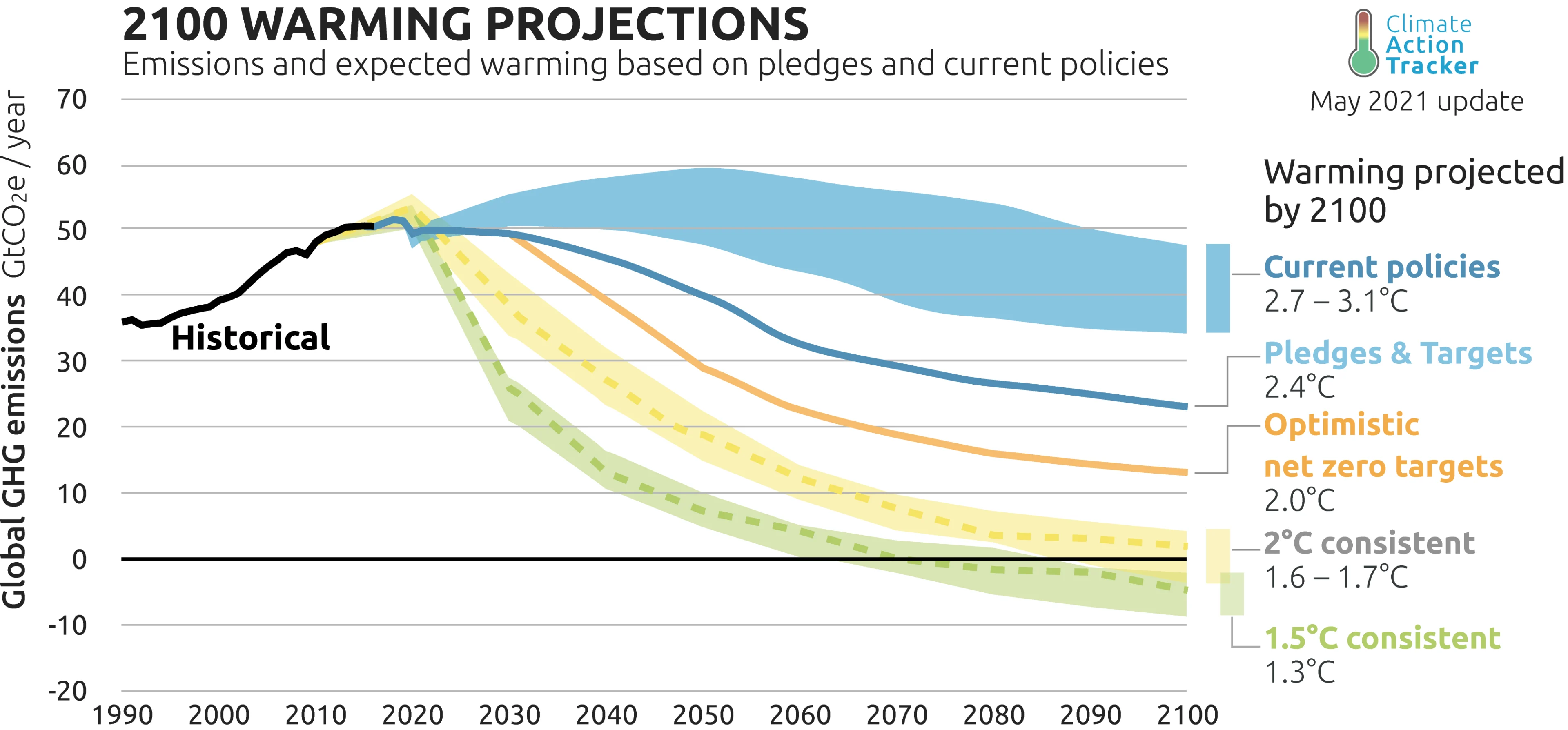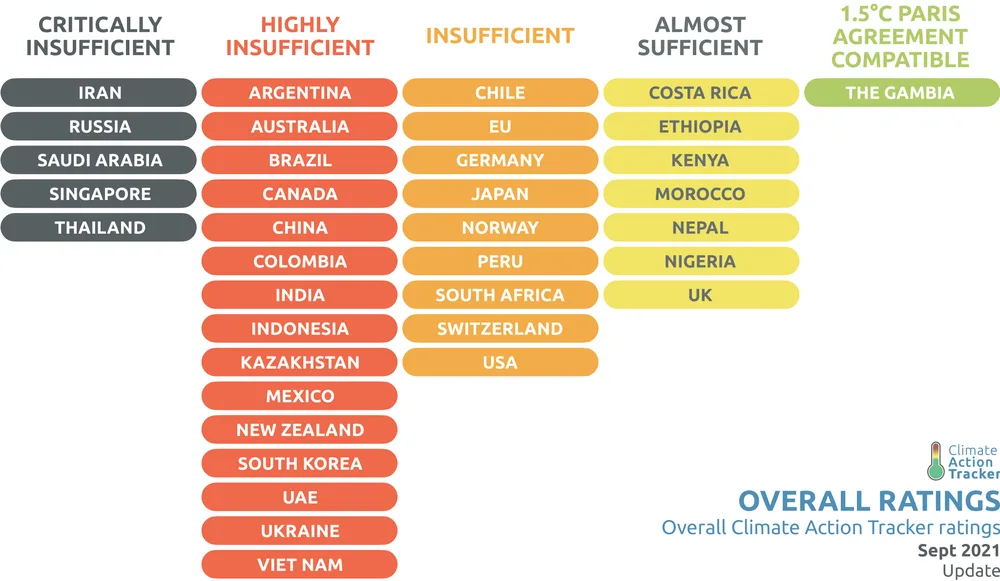
Just a single nation is on track to meet its climate targets, study says
A new rating system has determined that almost every country in the world is failing to meet the emissions targets required to avert the climate crisis. The top global economies, including the G20 nations, are shirking commitments set out in the Paris Agreement, the analysis found.
As climate impacts around the world manifest with more frequency and intensity, analysts continue to cite the 1.5°C rate of warming as a threshold not to be crossed. The latest IPCC report outlined the urgent necessity of addressing the 2030 emissions gap if there is any hope of limiting warming to that 1.5°C benchmark.
The rating system, from Climate Action Tracker (CAT), found that updates from nations on Paris Agreement targets for 2030 show a narrowing of the emissions gap by less than 15 per cent since 2015. The analysis considers this slow rate of narrowing a “code red” level of concern.

Climate Action Tracker (2021). 2030 Emissions Gap. May 2021. Available at: https://climateactiontracker.org/global/cat-emissions-gaps/. Copyright © 2021 by Climate Analytics and NewClimate Institute. All rights reserved.
“Momentum on updating 2030 targets has stalled since May, with no major emitters putting forward stronger climate targets,” Claire Stockwell, a Senior Climate Policy Analyst with Climate Analytics, told The Weather Network.
“Our analysis — from May 2021 — showed that if all net zero targets that have been announced or are being considered are achieved, global warming by 2100 could be as low as 2.0°C. Yet, reaching these net zero goals will not be possible without stronger near-term targets and action on the ground to cut emissions,” said Stockwell.
While the assessment is damning to the global effort as a whole, the evaluation of each country’s contributions varies. Of Australia, Brazil, Mexico, and Russia, among others, the report states that they have “failed to lift ambition at all,” submitting “the same or even less ambitious 2030 targets” than in 2015.
Only one developed nation — the UK — has put forward targets rated “1.5°C compatible” by the CAT rating system. But domestic targets are only one prong of the commitments laid out in Paris. When also factoring in “international climate finance” and “policies,” even the UK is failing.

Climate Action Tracker (2021). Net Zero Targets Assessment. September 2021. Available at: https://climateactiontracker.org/press/analysis-despite-code-red-on-climate-target-update-momentum-at-a-standstill/. Copyright © 2021 by Climate Analytics and NewClimate Institute. All rights reserved.
Canada, needing to improve across the board — in targets, policies, and finance — has been rated as “Highly Insufficient.” The analysis has found that Canada has failed to address carbon removal options and to provide “clarity on fairness” of its domestic targets.
“Canada needs to improve on all fronts, especially with respect to policy implementation and the provision of climate finance,” said Stockwell. “The country’s new and stronger 2030 target is not quite Paris compatible. Its revised climate plan and additional measures announced in the 2021 federal budget are insufficient to meet that target. Canada continues to face challenges in implementing policies,” said Stockwell.
Other nations dubbed “Highly Insufficient” by the report include emerging powers like China, India, and Brazil. While global players like Russia, Saudi Arabia, and Iran have been rated “Critically Insufficient.”

Climate Action Tracker (2021). Climate Action Tracker Rating Components. September 2021. Available at: https://climateactiontracker.org/press/analysis-despite-code-red-on-climate-target-update-momentum-at-a-standstill/. Copyright © 2021 by Climate Analytics and NewClimate Institute. All rights reserved.
In what is perhaps the report’s most glaring indictment, only one country — the developing nation of Gambia — received an overall rating of “1.5°C Paris Agreement compatible.”
There were, however, some points of optimism. Recent “significant” updates to climate targets and policies instituted by the EU and the United States — under the new Biden administration — have been called “positive movements” that must “urgently be followed by all other countries.”
“Many studies point to the economic benefits of acting on climate change: from avoiding the worst impacts, to co-benefits like health and wellbeing,” said Stockwell. “On the technical side, we know that renewable energy is far cheaper to install than fossil fuel power.”
In the lead up to COP26, the critical climate conference in Glasgow, the key word is urgent. The rating system makes clear that global emissions must be cut by 50 per cent before 2030 — it adds that currently “governments are nowhere near this.”
Thumbnail credit: Peter Cade/ Stone/ Getty Images











